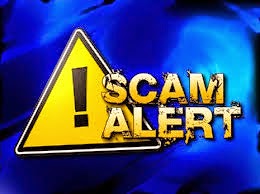By Leslie M Smith
The Personal Training industry is lightly regulated, so there is rampant opportunity for scams and criminals to prey upon naive aspiring trainers (and clients alike) and part them from their hard-earned money.
As much as I hate to admit it, I've personally been taken in a scam...just to give you an indication of how prevalent and easy it is to fall victim to these people.
There are literally over 500 certification organizations out there posing as "the best certification money can buy". With so many certifications out there by all these 'gurus' and experts, its no wonder that we are all so easily preyed upon by scam artists that wish to get a few hundred dollars from us.
There appear to be at least two types of scams out there that are popular today. I'll describe what I've learned so far to give you some help in avoiding them.
Personal Trainer "Certification" Scam
Just as the name implies, this is a ruse where a self-appointed guru offers a certification, certificate, degree, or other form of educational verification in return for classes, materials, supplements, but most of all, your money.
With so many certifications out there, it's almost impossible to advise how to watch out for these scams other than tell you that the NCCA approved certifications - plus a few other well respected organizations - are safe bets that I can guarantee you won't be a rip off.
I've even found people that try to sell you NCCA certification courses that aren't even associated with the group. Watch out for offers to help you pass exams if they aren't directly from the organization.
* Always deal directly with the Certification Organization through the web (directly to their website) or a direct call placed by you to them.
* No reputable certifications are distributed "in-house", "remotely" or in some guy's gym.
* Solicitations are almost always a sign of lack of legitimacy.
* Poor quality study materials (or even NO study materials!)
* Certifications based on "previous" or "life" experiences
* Claims that they are the 'Most Recognized' program, certification, or etc. No one certification holds that title, therefore the reputable ones do not try and claim such a position.
* Courses that are only online and incredible cheap.
* Non-Profit Status asserted as an advantage (possibly why their rates are so low, they'll say). None of the legitimate certifications are non-profit.
Personal Training "Job" Scam
The other common scam is a job offer - usually at high rates of pay unheard of in other job offers - that require you to pass their "particular" fitness certification. Although many jobs require you to be certified by one of the NCCA organizations (which is 100% legitimate), these have their own certification that you've never heard of before that they require you can begin working for them.
This type of scam is becoming more and more common as there are more and more personal trainers. They ask you to pay a modest fee, say $230, to take their certification exam. Surprisingly, you fail and the relationship is over.
Of course, it's not a real company. They have no address, no clients, no references, and no standing in the community. They are just collecting money from us to take their fake exam and then disappear.
Here are some helpful hints for avoiding job scams.
* If the certification you are asked to pass isn't well known, it's not a real company. Google has a lot of hits for real certifications.
* Paying to qualify for a job is illegal. Paying to take an exam for job qualification assessment is NOT common in the legitimate side of this industry. If your local fitness studio needs you to get a certification for their requirements, they will give you time to get it through a NCCA organization while you shadow or assist them on the floor.
* Uncommonly high pay for trainers with no experience is a red flag.
* All respectable jobs ask to see your certification papers during the interview. They don't just settle for phone screens.
Trust your instincts. When I was scammed, I knew something was wrong, but I didn't listen to my own doubts. I paid for it and learned my lesson well. I hope my publication of this article helps other current and aspiring trainers avoid the same fate.
Leslie Smith is a Certified Personal Trainer and owner of Fun-2B-Fit, LLC. She has published a book on "Becoming a Certified Personal Trainer" to assist aspiring trainers with their goals of becoming Certified Fitness Professionals.
Article Source: http://EzineArticles.com/


.jpg)